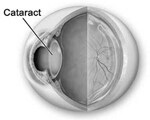A recent study found that women who take high-dose vitamin C supplements have a higher risk of developing age-related cataracts.

Women who take high-dose vitamin C supplements have a higher risk of developing age-related cataracts.
To look into the association of vitamin C supplements and incidence of age-related cataract, researchers examined 24,593 Swedish women, aged between 50 and 80 years. Overall, 59 percent of the 49 to 83 years old otherwise healthy women said they used a dietary supplement. Of these 5 percent only took vitamin C supplements and 9 percent took only multivitamins that contained about 60 milligrams of vitamin C. Of the 1,225 women who took only vitamin C supplements, 143 (nearly 13 percent) had cataracts removed during the study period.
By comparison, cataracts were removed in 878 of 9,974 women who did not use any supplements (roughly 9 percent) and in 252 of 2,259 multivitamin-only users (about 11 percent). Those who reported regular or occasional vitamin C supplementation of about 1000 milligrams per serving were about 25 percent more likely than those who did not take supplements to have age-related cataracts removed. Women who took extra vitamin C for 10 years or longer; or in combination with being 65 years and older, or taking hormone replacement or corticosteroid medications had even higher risk.
The higher cataract risk among the supplement users versus non-users remained evident in analyses that allowed for age by 5-year increments, waist size, education, smoking, alcohol drinking habits, and use of medications such as hormone replacement therapy.
However, the apparent link between vitamin C and cataract risk did not involve vitamin C obtained from fruits and vegetables. The results support cautious use of vitamin C supplements in healthy adults, especially women.
DoctorNDTV is the one stop site for all your health needs providing the most credible health information, health news and tips with expert advice on healthy living, diet plans, informative videos etc. You can get the most relevant and accurate info you need about health problems like diabetes, cancer, pregnancy, HIV and AIDS, weight loss and many other lifestyle diseases. We have a panel of over 350 experts who help us develop content by giving their valuable inputs and bringing to us the latest in the world of healthcare.












